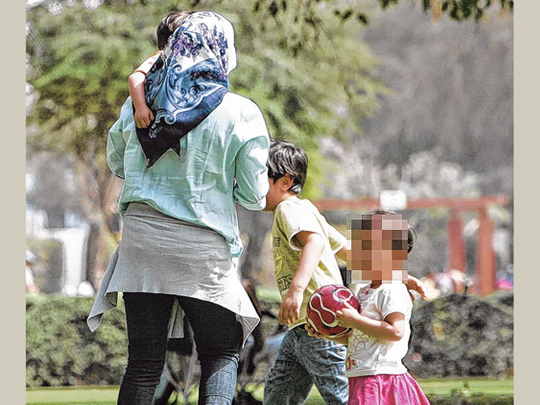
Dubai: It is high time families recognise the dangerous trend of housemaids and unqualified nannies rearing children, experts have warned, as a new study highlights the significant role of parents in maximising the potential of their children's education.
According to the study, 94 per cent of Emirati families employ maids and nannies for housework as well as rearing children; and so do five per cent of expatriate families.
The study called Parental Involvement in the Education of their children in Dubai, was presented at a forum organised by the Knowledge and Human Development Authority (KHDA) and the Dubai School of Government (DSG) yesterday. And was written by Raba'a Al Sumaiti, a bilingual inspector at the KHDA.
"Maids taking care of children, in between doing household chores and cooking, is a dangerous trend that could have a serious impact on the emotional, intellectual and cognitive development of children," Hala Babili Roumani, an academic advisor at Gulf Montessori, and a member of the UK-based Montessori Centre International, said at the forum.
"Many of these people don the role of the parents, in their absence. This is especially so because hiring domestic help is cheap and many parents do not recognise the importance of the early years."
The situation often leads to children falling badly behind in their schoolwork, as they were neglected in their formative years, when the child's mind is formed and their personality is developed, she said.
"It is a sensitive issue and we need to work around it," said Dr Shaikha Obaid Al Tunaiji, Assistant Professor, Department of Foundations of Education, UAE University. As an increasing number of women are part of the workforce now, so it is imperative to have more early childcare centres, where parents can entrust their children, she said.
Language skills
"Another major concern in maids looking after children is that often both their Arabic as well as English language skills suffer greatly," she added.
"While it is well known that parents who have better qualifications and a higher socio-economic status have children who perform better, research has demonstrated that good parenting approaches are also associated with improved student performance in academic tests," the study says. It recommends expanding the role of parents to benefit children, the school community as well as parents themselves.
"Many families are unaware of the important role that parents play in the emotional, behavioural, physical and cognitive development and well-being of their children," it says, urging the government to raise awareness and also set up an intergovernmental task force to promote the interests of parents at schools.
“More needs to be done starting from post-natal classes to encourage both parents to be actively involved in their child’s development from an early age and reduce the reliance on nannies and maids on a child’s upbringing.”
Parents need to be made more aware that reading to their child at a young age and taking a direct interest in what happens at school provides an effective learning environment for their children and leads to improved academic performance later in life, the study says.
In many schools, the only interaction between parents and the school is through infrequent parent-teacher interviews, it notes, stressing the need to expand engagement activities to include school governance arrangements, volunteering during school classes and regular feedback sessions.












